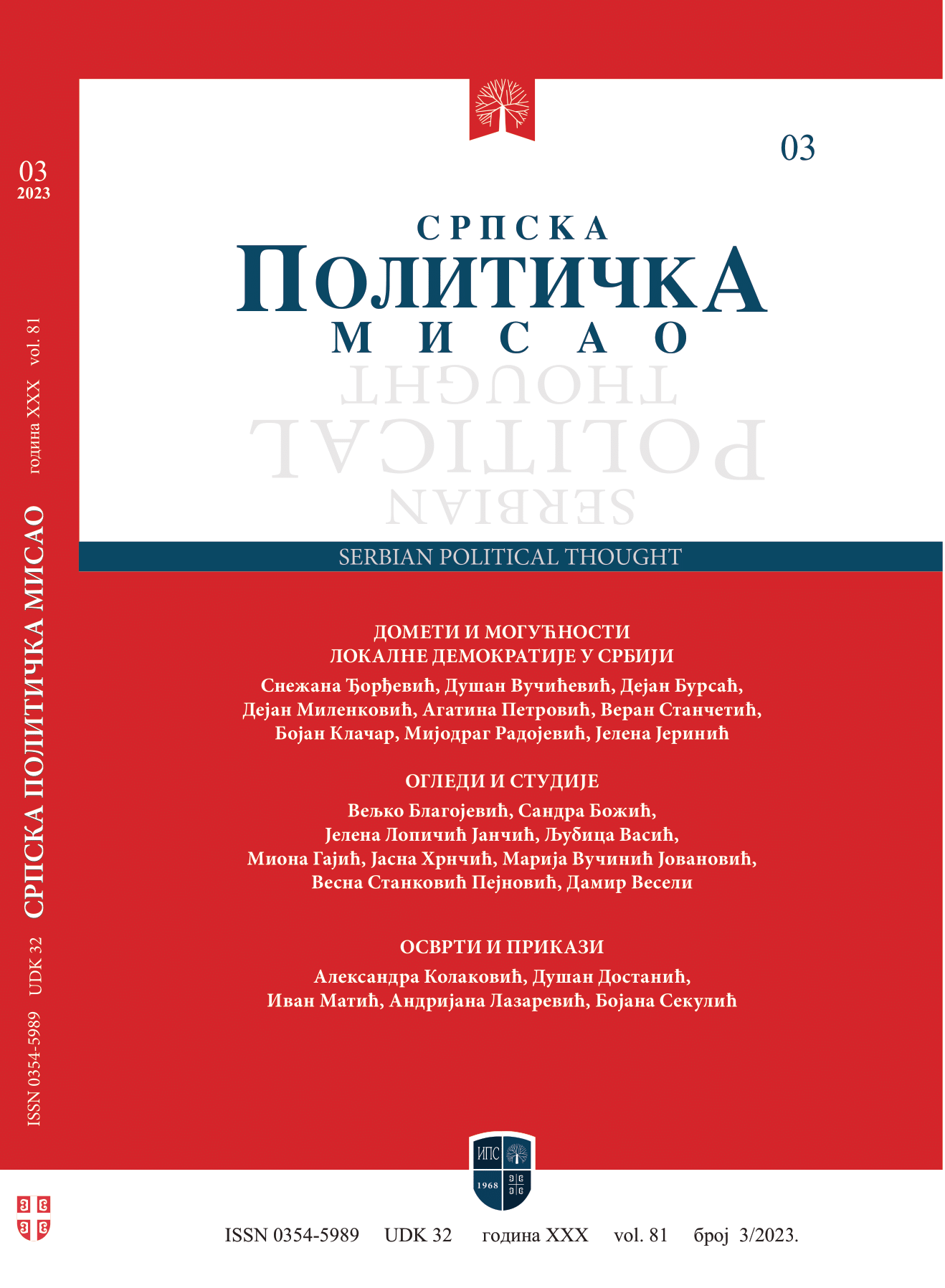Вредности хеленске културе као темељ Ничеове филозофије
Sažetak
Рад се бави Ничеовом (Nietzsche) намером да споји проучавања антике са својом критиком модерности која се налази у стању кризе. У сагледавању интелектуалног односа који Ниче развија у раној фази са грчким филозофима, могу се открити водећи проблеми који мотивишу велики део Ничеовог каснијег рада, али и стратегије решавања проблема које обележавају развој читавог његовог филозофског опуса. Цињ рада је доказати да се темељ Ничеове филозофије налази у вредносном систему старих Грка, док је централни проблем култура коју он тумачи кроз призму грчких културних вредности који усуглашавају мишљење, хтење и вољу за живот као вољу за моћ. Ниче твдри да модерна не може превазићи своју кризу јер у животу савременог човека не постоји воља за моћ као темељ воље за живот, а покретачка снага савременог друштва темељи се на исквареним системима вредности.
Reference
1. Ansell-Pearson, Keith. 1994. An Introduction to Nietzsche as Political Thinker Cambridge: Cambridge University Press.
2. Berry, Jessica. 2013. “Nietzsche and the Greeks. “ U Тhe Оxford handbook of Nietzsche, Ken Gemes, John Richardson, eds. 83-108. Oxford: Oxford University Press.
3. Church, Jeffrey. 2015. Nietzsche’s Culture of Humanity: Beyond Aristocracy and Democracy in The Early Period, Cambridge: Cambridge University Press.
4. Deleuze Gilles and Felix Guattari. 1994. What is Philosophy?, trans. Hugh Tomlinson and Graham Burchell, New York: Columbia University Press.
5. Gemes, Ken, Sykes, Chris. 2015. “The Culture of Myth and The Myth of Culture”, In Julian Young, ed. Individual and Community in Nietzsche’s Philosophy. 51-76. New York: Cambridge University Press.
6. Golomb, Jacob, 2006. “Wil to power,” In A Companion to Nietzsche, Keith Ansell Pearson, ed, 525-552. Oxford: Blackwell.
7. Hollingdale, R. J. 1965. Nietzsche: The Man and his Philosophy, Baton Rouge, LA: Louisiana State University Press.
8. Huddleston, Andrew. 2019. Nietzsche on the decadence and flourishing of culture, Oxford: Oxford University Press.
9. Jihun Jeong. 2021. „Nietzsche’s early concept of culture,“ Artigo 229-244.
10. Jurist, Elliot. 2000. Beyond Hegel and Nietzsche. Cambridge, Mass; London: MIT Press.
11. Kirk, Geoffrey Stephen. 1954. Heraclitus: The Cosmic Fragments. Cambridge: Cambridge University Press.
12. Leiter, Brian. 2002. Nietzsche on Morality. London: Routledge.
13. Marković, Miroslav. 1984. Filozofija Heraklita mračnog, Beograd: Nolit.
14. Martin, Nicholas 2004. Breeding Greeks: Nietzsche, Gobineau, and Classical Theories of Race Nicholas Martin, In Nietzsche and Antiquity: His Reaction and Response to the Classical Tradition. Paul Bishop, ed. 40 -54, Boydell & Brewer, Camden House.
15. Nehamas, Alexander. 1985. “How One Becomes What One Is”, In Life As Literature, Cambridge, MA: Harvard University Press.
16. Niče, Fridrih. 1981. Filozofija u tragičnom razdoblju Grka, Beograd: Grafos.
17. Niče, Fridrih,1984, Osvit, misli o moralnim predrasudama, Beograd: Rad.
18. Niče, Fridrih. 1985. Sumrak idola ili kako se filozofira čekićem. Beograd: Grafos.
19. Niče, Fridrih. 1986. Genealogija morala. Beograd: Grafos.
20. Niče, Fridrih. 1988. Ecce Homo. Beograd: Grafos.
21. Niče, Fridrih, 1998. „Rođenje tragedije ili helenstvo i pesimizam,“ u Spisi o grčkoj književnosti i folozofiji, 80-180, Sremski Karlovci, Novi Sad: Izdavačka knjižnica Zorana Stojanovića.
22. Niče, Fridrih. 1992. Tako je govorio Zaratustra, Beograd: BIGZ.
23. Niče, Fridrih.1997. Nesavremena razmatranja, Beograd: Prosveta.
24. Niče, Fridrih. 2005. Ljudsko, suviše ljudsko, Beograd: Dereta.
25. Nietzsche, Friedrich. 1988. Volja za moć, Zagreb: Mladost.
26. Nietzsche Friedrich, 1988а. Sämtliche Werke: Kritische Studienausgabe in 15 Einzelbänden, G . Colli and M . Montinari ed.(15 vols). Berlin: De Gruyter.
27. Nietzsche, Friedrich. 1983. Rođenje tragedije, Zagreb: Grafički zavod Hrvatske, Biblioteka „Zora”.
28. Nietzsche, Friedrich. 1990. “We Classicists,” In Unmodern Observations, New Haven, Conn: Yale University Press.
29. Nietzsche, Friedrich. 1996. Selected Letters of Friedrich Nietzsche, Cambridge: Hackett Publishing Company
30. Nietzsche, Friedrich. 1999. Antikrist, prokleto kršćanstvo. Zagreb: Izvori
31. Nietzsche, Friedrich, 2000. “Homer on Competition”, In Keith Ansell Pearson, Carol Diethe ed. On the Genealogy of Morality, 187–194, Cambridge: Cambridge University Press.
32. Nietzsche, Friedrich. 2002. S onu stranu dobra i zla. Zagreb: Dubravka Kozina Publisher.
33. Nietzsche, Friedrich. 2003 Radosna znanost. Zagreb: Demetra.
34. Potts, Alex. 1994. Flesh and the Ideal: Winckelmann and the Origins of Art History, New Haven: Yale University Press.
35. Porter, James. 2004. Nietzsche, “Homer, and the Classical Tradition” In Nietzsche and Antiquity: His Reaction and Response to the Classical Tradition. Paul Bishop, ed. 7-26. Boydell & Brewer, Camden House.
36. Solomon, Robert. 2003. Living with Nietzsche: what the great “immoralist” has to teach us, New York: Oxford University Press.
37. Stanković Pejnović, Vesna. 2014. Lavirint moći, Mediterran publishing, Novi Sad.
38. Stanković Pejnović, Vesna. 2021. “Glavni aspekti aktualnosti Nietzscheove kritike kulturalizma i naturalizma,” Filozofska istraživanja, 164 (41): 695–717.
39. Wilkerson, Dale. 2006. Nietzsche and the Greeks, London: Biddles Lt.
40. West, Cornel. 1999. The Cornel West reader. On Prophetic Pragmatism', New York, NY :Basic Civitas Books
41. Whitlock, Greg. 1997. “Examining Nietzsche's “Time Atom Theory” Fragment from 1873,” Nietzsche Studien 26 (1):350-360.
42. Wilkerson, Dale. 2006. Nietzsche and the Greeks, London: Biddles Lt.
43. Winckelmann, Јohann Joachim. 2006. The History of the Art of Antiquity, Los Angeles: Getty Research Institute.

